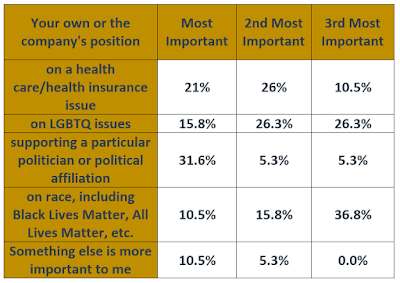I suspect more people know his name now than ever before, given what he said and the reaction to it. I've added emphasis on the sound bite that got him into hot water.
Today, it gives me great honor — and, by the way, we’re all truly blessed at the same time to have a leader like President Trump who is a builder. And that’s what my grandfather did: He came to this country to build, to grow, to prosper. And so we have an incredible builder, and we pray — we pray for our leadership, our President, and we pray for our country that we will continue to prosper and to grow.
 The reactions were as expected: multiple calls for boycotting from the left, with regular folks and political folks and celebrities all on board. Unanue and others called that 'cancel culture.'
The reactions were as expected: multiple calls for boycotting from the left, with regular folks and political folks and celebrities all on board. Unanue and others called that 'cancel culture.'Similarly, regular folks and political folks and celebrities on the right were equally on board with support for the company, Hatch Act be damned.
And prior calls for boycotts from the right be damned as well - I mean, that was then, and athletes, and this is now, and Trump.
I tossed a six-question survey up on Facebook looking for opinions on the influence of corporate political speech, if any, on people's buying choices: were they boycotters, joiners, or not swayed by this stuff? How long would they stay away from a company? And what contributes to their decision-making process?
I loosely defined 'corporate political speech', as comments and statements from executives, brand spokespeople, or from the company itself; advertising which supported or opposed a candidate, a political party, policy positions, and so on. Rather than pinning it down firmly, I followed the SCOTUS theory: some of this stuff, you simply know it when you see it.
There weren't a ton of responses, which didn't surprise me; I have a lot of vocal friends and we have some strongly opinionated conversations in person and online, but actually taking a survey? That's a 'meh' much of the time, and that's OK. Here's what I found out from the folks who did.
I asked whether people had stopped doing business with a company, started doing business with a company, or decided to never do business with a company because of corporate political speech.
- 63% of respondents said they have stopped being a customer,
- 26% said that they have become a customer, and
- 68% have chosen never to do business with a company because of political speech.
I also asked if there were any circumstances under which a person would go back to being a customer of a company they had boycotted. While 21% of respondents would not boycott in the first place,
- 31.5% would not go back under any circumstances;
- another 31.5% would, but only if they were unable to find a comparable product elsewhere; and
- 16% would go back if the company issued an apology.
I wanted to know what issues people found important in making the decision to begin patronizing, continue patronizing, or not patronize a company, and asked that respondents rank some hot-button issues in order of importance to them.
While LGBTQ issues are the most important based on overall ranking, the single most important thing playing into the decision-making process is the consumer's or the company's support of a politician or a political party.
The final question - a 'choose all that apply' - asked which factors might influence a respondent's decision to support - or boycott - a company that others are boycotting.
While LGBTQ issues are the most important based on overall ranking, the single most important thing playing into the decision-making process is the consumer's or the company's support of a politician or a political party.
- 58% said news media articles or posts;
- 42% said their own political position/party affiliation;
- 42% said discussions, including on social media, with friends/family;
- 21% said something else would be involved; and
- only 5% said social media posts.
I was pleased with the distinction between news articles and generic social media posts; I'm glad my friends are still paying attention to news, instead of just what will get clicks on social media. And, I'm also pleased that discussions, and sharing ideas, matter.
How would you answer the questions? And how do these results compare to what folks in your circle would say?
How would you answer the questions? And how do these results compare to what folks in your circle would say?


No comments:
Post a Comment
Thanks for sharing your thoughts!